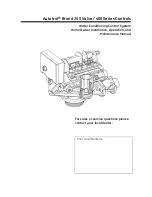
Safety Instructions
Installation Instructions
Operating Instructions
Care and Cleaning
Troubleshooting Tips
Customer Service
19
Venting System Inspection
The water heater’s internal flue must be
inspected annually to be certain it is
clean by removing the draft hood and
flue baffle.
When reinstalling the flue baffle make
certain it is hung securely by its hanger
at the top of the flue way.
Remove any scale that may have fallen
on the burner or floor shield and
reinstall the draft hood.
Inspect the gas venting system and the
chimney.
Make certain the vent connector from
the draft hood to the chimney is
properly positioned and securely
attached.
If after inspection of the vent system
you found sooting or deterioration
call the local gas utility to correct the
problem and clean or replace the flue and
venting before resuming operation
of the water heater.
Burner Inspection
Visually inspect the burners annually.
Inspect the main burner while firing
and pilot burner flame with the main
burner off.
If any unusual burner operation is noted,
the water heater should be shut off until
qualified service assistance can be
obtained.
For cleaning, remove the burner from the
water heater. A vacuum cleaner can be
used on the burner and floor shield
inside the water heater. The burner can
also be cleaned by scrubbing with mild
detergent.
CAUTION: For your safety, cleaning
of the main burner should be performed
only by qualified service personnel.
Proper burner and pilot flame
pattern.
Vacation and Extended Shut-Down
If the water heater is to remain idle for an
extended period of time, the power and
water to the appliance should be turned
off to conserve energy and prevent a
build-up of dangerous hydrogen gas.
The water heater and piping should be
drained if they might be subjected to
freezing temperatures.
After a long shut-down period, the water
heater’s operation and controls should
be checked by qualified service personnel.
Make certain the water heater is
completely filled again before placing it
in operation.
NOTE: Refer to the
Hydrogen Gas Caution in
the Operating Instructions.
Anode Rod
This water heater is equipped with an
anode rod designed to prolong the life of
the glass lined tank. The anode rode is
slowly consumed cathodically, thereby
eliminating or minimizing corrosion of
the glass lined tank.
Water sometimes contains a high
sulfate and/or mineral content and
together with cathodic protection
process can produce a hydrogen sulfide,
or rotten egg odor in the heated water.
Chlorination of the water supply should
minimize the problem.
NOTE: Do not remove
the anode rod from the
water heater’s tank,
except for inspection
and/or replacement, as
permanent removal will
shorten the life of the glass
lined tank and affect the
water heater warranty.






































